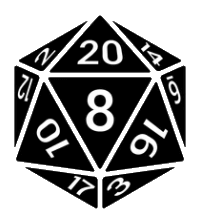A Gentle Introduction to Roleplaying Games - Part 2
◦◦◦ clueless to 1st character ◦◦◦
a ?-word article
At some point, your player-character will find herself involved in combat — perhaps not willingly (ambush, brigands). When combat ensues, the old addage may well apply: "I'm don't start fights, but I definitely finish them."
Truth to tell, depending upon the chosen personality and predilections of your player-character, s/he may indeed start a lot of fights.
In a roleplaying game, fights may be mortal, i.e., to the death, or they may be broken up by bystanders or what passes for law enforcement (bar fights, etc.) Regardless of the type of fight in which you find your player-character, your objective is usually to win.
When it comes to physical combat, not all player-character (i.e., PCs for short) are created equal. In many roleplaying games (Dungeons & Dragons being the most widely known), your player-character will have a vocation. In many game systems, this is called your character's class.
In Scarlet Horizons, the author's self-created setting and rules system for fantasy and far-future roleplaying, there are quite a few of these classes. The best combatants are those PCs (i.e., player-characters) who concentrate of the Fighter class —and its subclasses. These characters tend to hit the hardest and most accurately in combat.
New players who've never played a tabletop RPG may want to take the Fighter class. It's tendencies and modus operandi are well-reflected in literature, television, and movies (The Count of Monte Christo, Vikings, Bruce Lee movies, Blackhawk Down, etc.)
The thing about combat is, your foe(s) is/are trying to hurt you without getting hurt in turn. So, combat is a dance of martial skill — feints, lunges, haymakers, thrusts, slashes all interspersed with ducking, dodging, blocking, evading.
In many roleplaying games combat is simulated using dice rolls. Because dice introduce randomness, they lend themselves to combat, in which there is rarely a 100% chance of landing a sword stroke — or avoiding one.
In Dungeons & Dragons, and in my own Scarlet Horizons system and setting — which uses Kevin Crawford's Scarlet Heroes as a starting point for its mechanics — a twenty-sided die is used to determine if a combatant's attack successfully hits its intended target.
